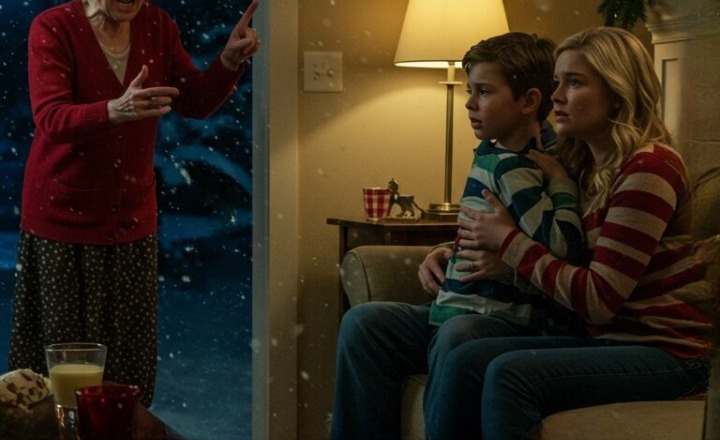Christmas Eve was supposed to feel warm and familiar—just me, my six-year-old son Mark, and the comfort of Grandma Rose’s home. But nothing about that night went the way it should have.
We pulled up after sunset, snow falling thick and quiet, the kind that softens the whole world. Mark hopped out of the car holding a drawing he’d made for Grandma—crayons, wobbly smile, her in a bright red sweater. He’d looked forward to this all week. Our first Christmas after the divorce, and I’d promised him it would still feel like family.
Cars filled the driveway, their shapes blurred by snow. Warm light spilled from the windows. Laughter drifted out—voices layered over each other. I carried a bag of small gifts. Mark knocked confidently.
The door opened a sliver.
My mother’s face appeared—cold, annoyed, like we were an inconvenience.
“What are you doing here?” she asked. No hello. No warmth.
“It’s Christmas,” I said, trying to stay steady.
She sighed like she’d expected this. “There’s no space. Every room is taken. Maybe next year.”
Mark stepped closer. “Is Grandma inside?”
She wouldn’t even look at him. “Go home. There’s no room.”
Then she shut the door.
The click felt like a punch. Mark stared at the door, gripping his drawing. “Did we do something wrong?” he whispered.
“No, sweetheart,” I said, though my voice trembled. “Let’s go.”
We drove through the falling snow in heavy silence. Mark leaned on the window, watching the glow of Grandma’s house disappear behind us. “I just wanted to give her my picture,” he said softly. That cracked something inside me.
Ten minutes later, my phone rang. Grandma.
“Where are you?” she demanded.
“Driving home. Mom said—”
“I don’t care what she said,” Grandma snapped. “Turn around. Come back.”
I didn’t argue. I turned the car around.
When we arrived again, the front door stood wide open. Grandma was outside in her slippers, dusted with snow, furious and determined.
“Inside,” she said.
The room went silent the moment we stepped in. Aunts, uncles, cousins—all frozen. My father stared at the floor. My mother stood near the fireplace, pale and stiff. My brother Ben looked like he wanted to blend into the furniture.
Grandma stood in front of us like a shield.
“Who told them to leave?” she asked.
No one answered.
She fixed her eyes on my mother. “Clare. I asked you a question.”
Mom scrambled for an excuse. “There wasn’t enough space. I didn’t think—”
“No,” Grandma said sharply. “You didn’t care.”
Then she turned to Mark, her voice instantly soft. “Come with me, sweetheart.”
In the kitchen, she took his drawing, kissed it, and taped it proudly to the fridge. “See? Perfect spot,” she said. He finally smiled.
She piled plates high with food for the two of us. Relatives drifted around awkwardly, but no one dared say a word under Grandma’s gaze.
Ben tried making small talk. Grandma shut him up with one look.
When it came time to open gifts, Mark gave her the snow globe he’d picked out—a tiny house in swirling snow. “It’s your house,” he told her. “The warm one.”
Grandma teared up as she hugged him. Then she whispered to me, “You raised the only truly good person here.”
We left later with full stomachs and heavy hearts. The snow softened again. Grandma walked us to the car and hugged me tight. “You and your boy will always have a place here,” she said. “Always.”
I thought that was the end of it—a terrible night saved by the only person who cared.
But I was wrong.
After we left, Grandma called every relative:
“Be here at 8 a.m. We’re having a family meeting.”
They didn’t know what was coming.
The next morning she called me too. “Bring Mark,” she said. “They need to hear this.”
When we arrived, the living room was full. Everyone tense.
Grandma came in with an old wooden box—the one she used for important documents. She set it on the table and looked straight at my parents.
“Years ago,” she began, “you came to me for help when Mark’s father lost his job. I gave you money. Money meant for your grandchildren’s future.”
My mother tensed. “That was a long time ago—”
Grandma opened the box and pulled out bank records—withdrawals, receipts, all in my mother’s handwriting.
“You didn’t use that money for your child,” Grandma said. “You used it for vacations and jewelry.”
My father tried to interrupt. “Mother—”
“Forcing your grandson out into the snow last night was unforgivable,” Grandma said, raising her voice. “You showed exactly who you are.”
Ben looked sick. He’d clearly known.
Then Grandma pulled out one last document.
“This is my new will,” she said. “Everything I own—my house, my land, my savings—goes to Mark. Not you.”
My mother exploded. “You can’t do this!”
“I already have,” Grandma replied.
Then she asked them all to leave. My mother stormed out shaking. My father followed, silent and ashamed. Ben hesitated until Grandma glared, and then he left too.
The door slammed hard enough to rattle the windows.
When it was finally quiet, Grandma sank into her chair, exhausted but relieved.
“I should’ve protected you a long time ago,” she whispered. “But I’m doing it now.”
That was five years ago.
Grandma passed away last spring, peaceful and loved. Her house—now legally mine—still smells like cinnamon every time we bake her cookies. Mark is almost eleven now—taller, wiser, still gentle in a world that isn’t always kind.
Every Christmas Eve, we drive to her old home and light candles in the windows, the way she always did. Mark tapes his drawing above the fireplace. And when the snow begins to fall, he always whispers, “Grandma’s here.”
And he’s right.
Some people stay long after they’re gone—especially the ones who chose love when everyone else chose cruelty.
Grandma didn’t just leave us a house.
She left us peace. And that’s worth more than anything.
